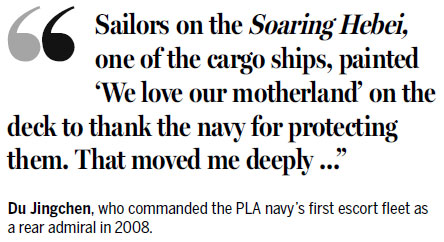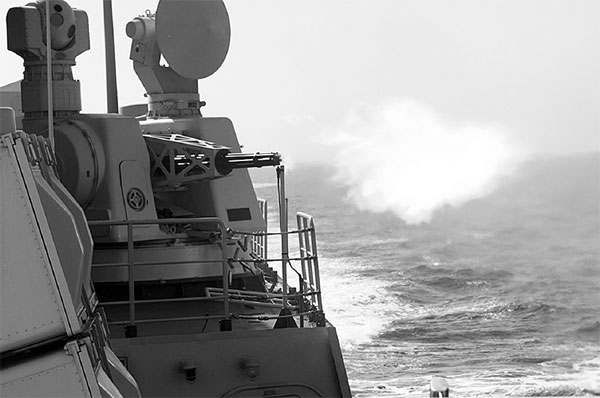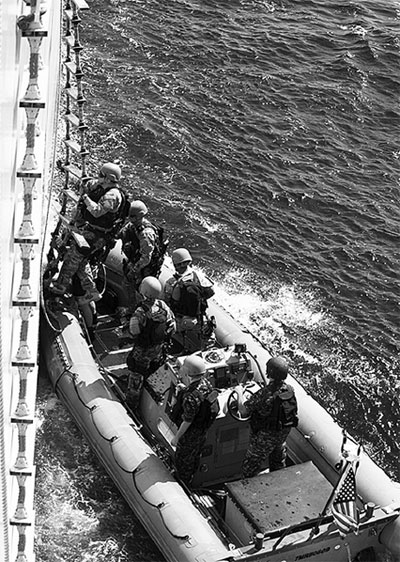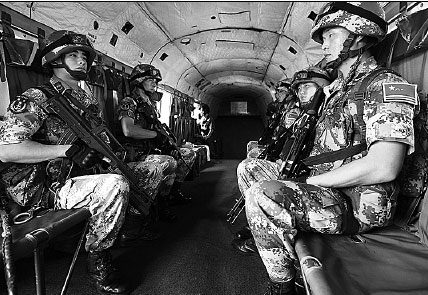Setting sail against a sea of troubles
Updated: 2015-02-12 07:38
By Zhao Lei(China Daily)
|
|||||||||||
The PLA navy has long been at the forefront of international efforts to provide assistance and safe passage in the pirate-infested waters off Somalia's east coast, reflecting China's commitment to protecting trade routes and the global economy, as Zhao Lei reports.
Over the past six years, sailors from around the world have become accustomed to hearing the same announcement, albeit issued in a variety of voices.
"This is the Chinese navy escort task force. Any ship in need of assistance please call us via Channel 16," the announcer says in Chinese and English, several times a day.
|
The 18th escort fleet of the Chinese People's Liberation Army navy during a Sino-US joint maritime anti-piracy drill in the waters of the Gulf of Aden on Dec 11. The Chinese navy has been a leading player in the fight against piracy since 2009. Ren Jianwen / Xinhua |
|
US navy sailors prepare to visit the PLA navy frigate Yuncheng during a joint maritime drill in the waters of the Gulf of Aden on Dec 11. Zhang Biao / Xinhua |
|
A sailor of the 7th escort fleet of the PLA navy performs with her accordion in 2011, the first time the fleet had included 10 female sailors. Fan Junwei / Xinhua |
|
Chinese navy soldiers travel by helicopter during an escort mission on Aug 26. Zhang Yuelin / Xinhua |

"Every time I hear the announcement, I feel safe and relieved because I know we are entering 'secure waters' patrolled by our navy ships," said Zhou Zongjia, captain of the Xinchiwan, a container ship operated by China Shipping Group Co. "Every member of my crew is proud of our navy because it has offered protection to numerous ships from China and other nations. Seafarers know they can count on Chinese warships in the event of piracy."
Zhou and his crew have sailed the waters of the Gulf of Aden many times. Last week, the Ministry of Transport and China Shipowners' Association dispatched the Xinchiwan to ferry fresh fruit and vegetables to the 19th escort fleet of the People's Liberation Army navy, which is conducting counter-piracy operations off the coast of Somalia.
"We feel privileged to deliver supplies to our escort fleet. The navy's sailors are like my brothers," Zhou said.
Ni Zanding, an officer on a Hong Kong-registered bulk carrier, said that before 2009 he was always anxious about coming under attack from the pirates whenever his ship sailed off the east coast of Somalia or close to the Gulf of Aden.
However, in late 2008, the Chinese government decided to send a task force to escort shipping in the area after a year in which more than 250 Chinese civilian ships, mostly cargo vessels and chemical tankers, were attacked or hijacked by Somali pirates and about 50 Chinese nationals were taken hostage. The attacks followed the murder of a Chinese sailor by pirates in May 2007, after his employer refused to pay a ransom.
Anti-piracy missions
The Gulf of Aden forms part of the Suez Canal route between the Mediterranean Sea and the Arabian Sea in the Indian Ocean, and more than 21,000 ships cross the gulf every year. In the past 10 years, the area has evolved into a hub of pirate activity that has substantially disrupted global maritime trade.
In 2013, piracy cost an estimated $3 billion to $3.2 billion in terms of counter measures and the loss to the global economy, according to Oceans Beyond Piracy, a nonprofit project in the United States. Every thwarted attack cost the international community an estimated $139 million.
In June 2008, the UN Security Council unanimously voted to allow countries to send warships into Somalia's territorial waters to tackle the pirates. In October of the same year, the UN Security Council unanimously adopted a resolution that called on nations with vessels in areas plagued by the pirates to use military force to suppress their activities.
On Dec 26, 2008, the PLA navy's first escort fleet set sail from Sanya in Hainan province, signaling the Chinese navy's largest-ever overseas deployment.
After sailing more than 4,400 nautical miles (8,150 km) in 10 days, the task force - guided-missile destroyers Wuhan and Haikou, and a supply ship, Weishanhu - arrived in the Gulf of Aden, and immediately began escorting four Chinese cargo ships.
Vice-Admiral Du Jingchen, who commanded the escort fleet as a rear admiral, said the crews of the cargo ships had admitted that every time they sailed the waters they were unable to sleep because they were so nervous.
"Sailors on the Soaring Hebei, one of the cargo ships, painted 'We love our motherland' on the deck to thank the navy for protecting them. That moved me deeply, and inspired all of us to do our best to honor the navy's commitment," he said.
"On the second day after our arrival, we detected two pirate ships that intended approaching cargo ships under our protection. I ordered a gun crew to fire a warning shell and the pirates fled," Du recalled. "Since then, our ships have protected numerous civilian vessels from the pirates over the past six years. Some cargo ships even anchor in the Red Sea and wait for our escort."
Some vessels could only operate at low speeds and were unable to keep pace with the convoys, so PLA commandos were dispatched to teach the crews counter-piracy measures and demonstrate how to make improvised weapons, such as bombs made out of diesel oil.
Li Huajie, a junior lieutenant with the PLA navy's East Sea Fleet, said the members of the task force have to overcome a tough environment and homesickness when they first participate.
"We didn't have enough fresh vegetables, fruit or water. The satellite phones were often out of service due to a bad signal, so sometimes we could only call our families every two or three weeks," said Li, who took part in the convoy operation in 2011. "Sometimes the waves were so strong that even some veteran sailors vomited. Despite all those hardships, we fulfilled all our responsibilities and brought honor to the Chinese navy."
Cooperation platform
By the end of January, 16,000 sailors, approximately 1,300 marines, 42 helicopters and more than 30 PLA navy ships had undertaken more than 800 escort convoys for almost 6,000 merchant vessels, half of them from foreign countries, according to Ministry of Defense statistics.
Chinese escort ships have also rescued or assisted more than 60 civilian vessels that were being tracked, or had been hijacked, by pirates.
Away from the Gulf of Aden, in 2011 Chinese naval forces also assisted with the repatriation of thousands of overseas Chinese from war-torn Syria. Last year, they also provided security for vessels transporting Syrian-made chemical weapons to Italy, and participated in the search for the missing Malaysia Airlines Flight MH370.
The 19th escort fleet is currently patrolling the Gulf of Aden and the waters off Somalia. The fleet has three ships - the frigates Linyi and Weifang, and the supply ship Weishanhu, with a combined force of more than 700 sailors and marines.
The regular nature of the escort missions also provides a platform for the PLA navy to cooperate and communicate with foreign navies. Since 2009, escort fleets have been composed of warships from the US, Russia, the European Union and NATO countries. Every day, Chinese commanders are briefed by, and share intelligence with, their foreign counterparts, and multinational convoys are regular events. In addition, officers are frequently sent to other nation's ships to gain experience and share expertise.
Rear Admiral Zhuo Yixin, political commissar of the 13th escort fleet, said the rising number of exchanges and cooperation with other navies has enabled the Chinese officers to spot their own weaknesses and learn from others.
Missions to continue
Major General Jiang Chunliang, a military strategy researcher at the PLA Academy of Military Science, said: "The escort missions have contributed significantly to world peace and global trade, and have also greatly strengthened the PLA navy's operational capabilities."
Missions such as escort duty test the combat readiness of the navy and its personnel, and show the world that China is serious about protecting its trade routes, according to Jiang.
"In addition, the navy has used long-distance, long-duration missions to fine-tune its logistics system and the reliability of Chinese destroyers, frigates and supply ships," he said.
In December, Admiral Wu Shengli, commander of the PLA navy, said the continuing threat of piracy in the Gulf of Aden and off Somalia means China will continue to send convoy fleets on the long, arduous missions.
He urged officers to use the experience and expertise gained through the escort operations to improve their command, organizational and international-exchange skills.
Vice-Admiral Du said: "Our escort missions have effectively curbed the pirates, helped China to discharge its global responsibilities as a leading nation, safeguarded the country's strategic maritime passages, and boosted exchanges with foreign navies. In addition, they've improved the navy's ability to execute a wide range of tasks, and provided us with an opportunity to fly the flag for China."
Contact the writer at zhaolei@chinadaily.com.cn
(China Daily 02/12/2015 page5)
Today's Top News
Greek PM easily wins confidence vote
Contact group on Ukraine reaches ceasefire deal
China should be alert to deflation risks
Atletico Madrid to open 200 stores in China
Greece eyes bridge agreement next week
G20 plans decisive monetary, fiscal action
Gunmen fire on Marseille police as PM Valls visits city
Obama says still weighing decision on arming Ukraine forces
Hot Topics
Lunar probe , China growth forecasts, Emission rules get tougher, China seen through 'colored lens', International board,
Editor's Picks

|

|

|

|

|

|









